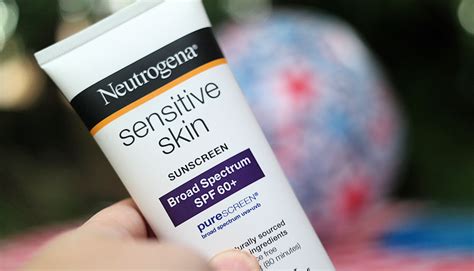Introduction
The sun’s ultraviolet (UV) rays can damage the skin, leading to premature aging, wrinkles, and even skin cancer. Sun protection is essential for everyone, but it is especially important for those with sensitive skin. Sensitive skin is more prone to irritation, redness, and inflammation, so it is important to use a sunblock that is gentle and non-irritating.

What is Sensitive Skin?
Sensitive skin is a common condition that can affect people of all ages and skin types. It is characterized by a number of symptoms, including:
- Redness
- Irritation
- Itching
- Dryness
- Flaking
- Scaling
- Burning
- Stinging
Sensitive skin can be caused by a number of factors, including:
- Genetics
- Skin conditions such as eczema and rosacea
- Certain medications
- Environmental factors such as pollution and harsh weather conditions
Why is Sun Protection Important for Sensitive Skin?
The sun’s UV rays can damage the skin in a number of ways. UVA rays penetrate the skin’s dermis, where they damage collagen and elastin, leading to wrinkles and sagging. UVB rays penetrate the skin’s epidermis, where they can cause sunburn, skin cancer, and other skin damage.
Sun protection is essential for everyone, but it is especially important for those with sensitive skin. Sensitive skin is more prone to damage from UV rays, so it is important to use a sunblock that provides broad-spectrum protection from both UVA and UVB rays.
How to Choose the Best Face Sunblock for Sensitive Skin
When choosing a face sunblock for sensitive skin, there are a few things to keep in mind:
- Broad-spectrum protection: A broad-spectrum sunscreen will protect your skin from both UVA and UVB rays.
- SPF: SPF (sun protection factor) measures how well a sunscreen protects your skin from UVB rays. The higher the SPF, the more protection you have.
- Mineral or chemical: Mineral sunscreens use zinc oxide or titanium dioxide to physically block the sun’s rays. Chemical sunscreens use chemicals to absorb UV rays. Mineral sunscreens are generally considered to be more gentle and non-irritating than chemical sunscreens, so they are a good choice for people with sensitive skin.
- Ingredients: Some sunscreens contain ingredients that can be irritating to sensitive skin, such as fragrances, dyes, and alcohol. When choosing a sunscreen for sensitive skin, it is important to choose one that is fragrance-free, dye-free, and alcohol-free.
The Best Face Sunblocks for Sensitive Skin
The following are some of the best face sunblocks for sensitive skin:
- CeraVe Hydrating Mineral Sunscreen SPF 30: This mineral sunscreen is gentle and non-irritating, and it provides broad-spectrum protection from UVA and UVB rays. It is also fragrance-free, dye-free, and non-comedogenic, so it is unlikely to clog pores.
- EltaMD UV Clear SPF 46: This mineral sunscreen is also gentle and non-irritating, and it provides broad-spectrum protection from UVA and UVB rays. It is also fragrance-free, dye-free, and non-comedogenic, and it is oil-free, so it is a good choice for people with oily or acne-prone skin.
- La Roche-Posay Anthelios Mineral Tinted Sunscreen SPF 50: This mineral sunscreen is tinted, so it can help to even out skin tone and provide a light coverage. It is also gentle and non-irritating, and it provides broad-spectrum protection from UVA and UVB rays.
-
Revision Skincare Intellishade TruPhysical Anti-Aging Daily Moisturizer SPF 45:
This hybrid sunscreen is a combination of mineral and chemical sunscreens, and it provides broad-spectrum
protection from UVA and UVB rays. It is also anti-aging, and it contains ingredients that can help to improve the appearance of wrinkles and fine lines.
How to Apply Face Sunblock
To properly apply face sunblock, follow these steps:
- Cleanse your face.
- Apply a moisturizer.
- Apply a sunscreen with an SPF of 30 or higher to your face, neck, and chest.
- Reapply sunscreen every two hours, or more often if you are swimming or sweating.
Conclusion
Sun protection is essential for everyone, but it is especially important for those with sensitive skin. By choosing the right sunscreen and following these tips, you can help to protect your skin from the sun’s harmful UV rays.
Frequently Asked Questions
- What is the best SPF for sensitive skin?
An SPF of 30 or higher is recommended for sensitive skin.
- How often should I reapply sunscreen?
Sunscreen should be reapplied every two hours, or more often if you are swimming or sweating.
- Can I use sunscreen on my face if I have acne?
Yes, there are sunscreens that are specifically designed for acne-prone skin. These sunscreens are non-comedogenic, so they will not clog pores.
- What are the signs of sun damage?
The signs of sun damage include wrinkles, fine lines, age spots, and skin cancer.
- How can I prevent sun damage?
The best way to prevent sun damage is to avoid the sun during peak hours (10am-4pm), wear protective clothing, and use a sunscreen with an SPF of 30 or higher.
Additional Tips for Protecting Sensitive Skin from the Sun
In addition to using a sunscreen, there are a few other things you can do to protect your sensitive skin from the sun:
- Wear protective clothing, such as long sleeves, pants, and a hat.
- Avoid the sun during peak hours (10am-4pm).
- Seek shade whenever possible.
- Use a sunshade in your car.
- Reapply sunscreen every two hours, or more often if you are swimming or sweating.
- Avoid tanning beds.
Conclusion
By following these tips, you can help to protect your sensitive skin from the sun’s harmful UV rays.












